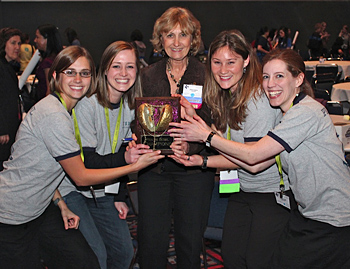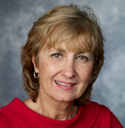Anyone looking for students around the UT Dallas Callier Center for Communication Disorders and who finds the classrooms are empty can just wander down to Jan Lougeay’s office and probably hit pay dirt.
As director of clinical education at Callier, Lougeay is part academic, part scheduling wizard and part life coach. Earnest young students know they can go to her whenever they have a question about a class next semester or career goals for the next two decades.

Jan Lougeay celebrates with Callier Center team members who won the 2011 Praxis Bowl competition, which tests students on their knowledge of speech-language pathology.
“Jan has developed a huge following among students who have come through this program because she has always gone out of her way to help them succeed,” said Dr. Robert Stillman, program head of Communication Sciences and Disorders. A professor in the School of Behavioral and Brain Sciences, Stillman has worked closely with Lougeay during the past 32 years to create and expand the fast-growing and internationally respected program.
Lougeay is scheduled to receive the Texas Speech Hearing Association’s (TSHA) Award of Honors this month, recognizing her commitment to the field. The award is presented annually to speech-language pathologists or audiologists who have contributed significantly to the organization and demonstrated outstanding leadership and professional excellence.
Lougeay says she feels lucky to have a job that continues to challenge and excite her. “I learned early on that our profession is dynamic, and I hope to inspire our students to be lifelong learners so they are confident in meeting the challenges of treating their patients,” she said.

“I learned early on that our profession is dynamic, and I hope to inspire our students to be lifelong learners so they are confident in meeting the challenges of treating their patients.”
Jan Lougeay,
director of clinical education
Lynda Barbee, a speech pathologist who helped nominate Lougeay, described her as students’ “go-to person” for direction, advice and encouragement.
“She planted the seed of ‘giving back’ to the profession in the hearts and minds of future professionals, and this continues to bear fruit in the younger leaders of TSHA today,” she wrote in her nomination letter. “Jan has fostered future leaders in our profession.”
Lougeay also teaches at Callier, focusing largely on stuttering, voice disorders and autism. She and Stillman developed the Preverbal Program for severely language-impaired toddlers. She founded a summer camp for stuttering children called Tricks for Talking, which emphasizes the fun in communication.
Lougeay’s influence extends far beyond UT Dallas through her participation in TSHA and other professional organizations. She has helped develop training and research protocols for assessment of voice and stuttering.
Speech language pathologist Shannon Raby is a former student who previously worked with her at Callier. “Jan has had such a huge impact on the UT Dallas students through her compassion, joy of the job and consistent hard work to accommodate all personalities,” Raby said. “She has given students the inspiration to keep going even when things got difficult. She has always been super-understanding and very insightful with her students.”
Lougeay also recently heard about another honor coming her way, this time from inside Callier. Dr. Christine Dollaghan, a BBS professor, and Executive Director Dr. Thomas Campbell have established the Janice Lougeay Opportunity Fund in her honor. The new fund will support innovative approaches to improve clinical education in communication disorders.
“Jan is a hub for all three of Callier’s essential aims: educating graduate students in communication sciences, providing clinical service to patients and facilitating research into communication disorders,” Dollaghan said. “She leads an astonishing array of activities for the benefit of Callier and UT Dallas, all with grace and good humor. We saw the opportunity fund as a way of letting her know how much her contributions are appreciated.”
Lougeay, meanwhile, can’t deny her success.
”I’m a child of the ’60s, and I started out my career wanting to make a difference in the world,” she said. “I think that has happened. I’ve worked with outstanding students and talented professionals who have later gone out and made a huge difference in the daily lives of their own patients. That’s something to be proud of.”